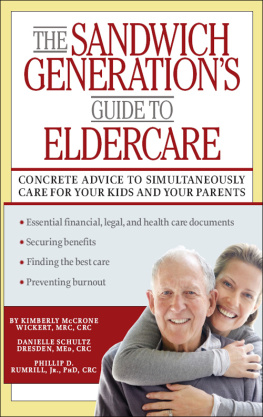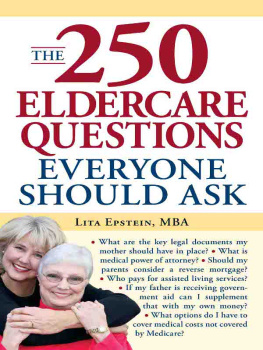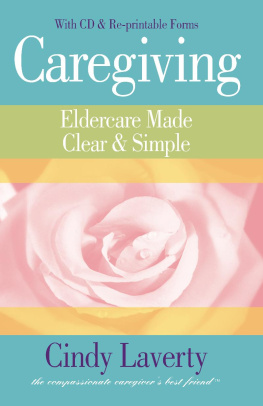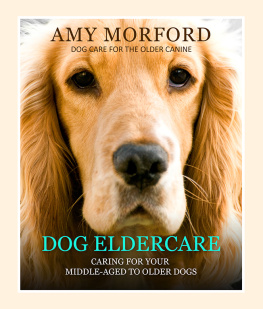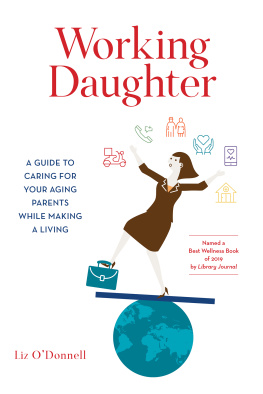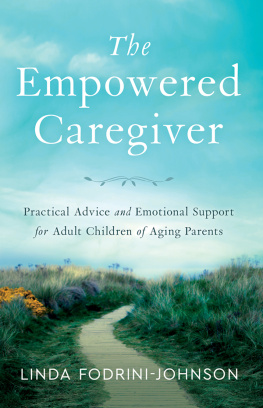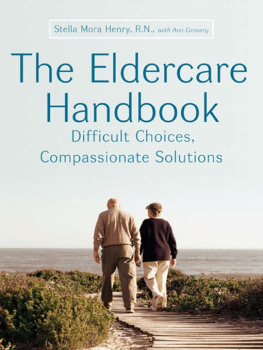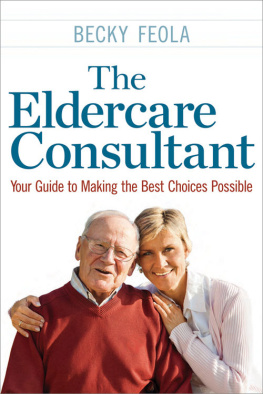The
SANDWICH
Generations Guide
to Eldercare
The
SANDWICH
Generations Guide
to Eldercare
Kimberly McCrone Wickert, MRC, CRC
Danielle Schultz Dresden, MEd, CRC
Phillip D. Rumrill, Jr., PhD, CRC

KMW: For Scott, Jake, and Delaney; Mom and Dad; and Chuck,
Christine, Kurt, Judiann, Fay, Ann, and Robyn.
DSD: For Jason, Ben, Jenae, and Blake; My sister,
Dana; and Stewart Schultz (Papa).
PDR: For Amy; Stuart, Douglas, and Nathan;
Mom and Dad; and Gram and Gramp.
Contents
Preface
W ith the ever-aging Baby Boomer generation consisting of more than 77 million Americans and the populace of the United States becoming older thanks to life-prolonging medical advances, more families than ever before face the challenge of providing care and support to multiple generations at the same time. Many people find themselves sandwiched among three and even four generations of their loved ones, and the needs of their children, parents, and grandparents can be difficult and even overwhelming to meet. Today, one out of every eight Americans between the ages of 40 and 60 is raising a child or children while caring for elderly parents or grandparents, according to Pew Research Center.
How do families navigate the complicated and costly process of planning for their childrens futures, saving for their retirement, and providing the care and support that their elderly loved ones need? How do they know when it is time to make a change in housing or health care on behalf of an aging parent or grandparent? What are the legal, financial, emotional, and practical implications of eldercare decisions for the rest of the family? How can families, including blended families, minimize and/or manage the conflict and tension that often accompanies eldercare decisions? What are the best ways to help the elderly maintain their independence, dignity, and comfort even as they require more help with activities of daily living and decision making than they did in their younger years? What if the elder is gay, lesbian, bisexual, or transgender? What resources exist to help those sandwiched between generations to provide effective and responsive eldercare for their families?
The Sandwich Generations Guide to Eldercare was written to answer these questions. In addition to our extensive experience in the rehabilitation and health care fields, the three authors of this book have all gone through the eldercare process with our own loved ones. We have flavored this book with our own eldercare experiences and the insights of other members of the Sandwich generation who have gone through this process with their loved ones. Intended for people who are providing eldercare for their loved ones while raising families of their own, health care professionals in geriatrics and long-term care, rehabilitation professionals, social workers, counselors and psychologists, health care and assisted living administrators, benefits planning specialists, and college and university students in related disciplines, this book serves as a guide to eldercare developed by those who have done it. We hope that the lessons we have learned through our own personal and professional experiences will help you and your loved ones in your efforts to help them age in comfort and with dignity.
Kimberly McCrone Wickert
Danielle Schultz Dresden
Phillip D. Rumrill, Jr.
Acknowledgments
W e would like to express our sincere gratitude to the people who made this book possible and successful. First and foremost, we recognize our parents and grandparents whose needs for eldercare and experiences with aging in contemporary America prompted us to write this book: Judy McCrone, Henry McCrone, Fay Wickert, Stewart Papa Schultz, Beverly Rumrill, and Harry Rumrill. Watching these ordinary heroes age while attempting to maintain their independence and dignity made us realize that countless families face the same daily challenges of caring for aging loved ones that our families have tried to navigate. It is our hope that some of what we have learned about eldercare in our own families, coupled with our professional experience in the human services field, will be useful to others in the Sandwich generation who are responsible for the care, comfort, and well-being of their own heroes.
And speaking of heroes and loved ones, we know that we could not have completed this book without the love, support, and forbearance of our beloved spouses. Scott Wickert, Jason Dresden, and Amy Rumrill lent their (usually) constructive criticism as proofreaders, editors, technical consultants, sounding boards, coaches, therapists, and cheerleaders throughout this project. Often, they provided direct and clear feedback about the content of our book, the time we devoted to writing it, our performance as spouses and parents vis vis our writing activities, and a variety of other subjects without even being asked! Only the most devoted spouses and partners would be so free and generous with their perspectives. In all seriousness, we know how fortunate we are to be sharing our lives with our best friends, our steadfast partners, and our true loves. Scott, Jason, and Amywe thank you from the bottoms of our hearts.
This book focuses on the generations that came before us, namely, our parents and grandparents, but we want to acknowledge the generation that will succeed us as the inspiration for everything we do. The Oak Ridge Boys had it right: Thank God for Kids. We thank God for ours: Jake Wickert, Delaney Wickert, Ben Martin, Jenae Martin, Blake Dresden, Connor Pittman, Nathan Rumrill, Doug Rumrill, Stuart Rumrill, Cassidy Pittman, and Chad Pittman. Jake, Delaney, Ben, Jenae, Blake, Connor, Nathan, Doug, Stuart, Cassidy, and Chadthank you for constantly reminding us of the wonder of youth, for the smiles and laughter that keep us young, for the chores you occasionally do without being asked, for not rolling your eyes too often or too obviously when we tell you stories about our own childhoods, and for giving our lives purpose and meaning that can only be found by raising children. And, if our deep gratitude and profound pride in you are not acknowledgment enough, you may be interested in knowing that we will use the royalties from this book to increase your allowance!
For their editorial and clerical assistance, we thank Mr. Jesse Wray and Ms. Samantha Haynie of Kent State University. Special thanks go to Dr. Mary Dellman-Jenkins, Attorney Margaret Kreiner, Mr. Jim Krosky Attorney Wade W. Smith, Jr., Attorney Kelly Willis, and Mr. Karl Zalar whose professional expertise and insights made invaluable contributions to this book.
Last, but certainly not least, we extend our heartfelt appreciation to Julia Pastore and the editorial staff at Demos Health for the opportunity to write and publish this book. We look forward to many more collaborative endeavors in the years to come.
ONE
You Are Not Alone: The Graying of America and the Role of the Sandwich Generation in Providing Eldercare
T he face of America has been changing, or graying, more accurately. The United States now boasts a senior population that is larger than at any other time in the countrys history, and the proportion of elderly people in the American populace is likely to increase for the next several decades. According to a report from the U.S. Census Bureau, in 1980 there were 720,000 people aged 90 and older in the United States. In 2010, there were 1.9 million people aged 90 and older; by 2050, the ranks of people 90 and older may reach 9 million. Increased life expectancies are one reason for the projected growth in our senior population, but the large population of Americans who are currently in middle age is the main reason for the expected increase in elderly people over the next two or three decades. Termed Baby Boomers, these people are identified by birthdates between 1946 and 1964 and number approximately
Next page
